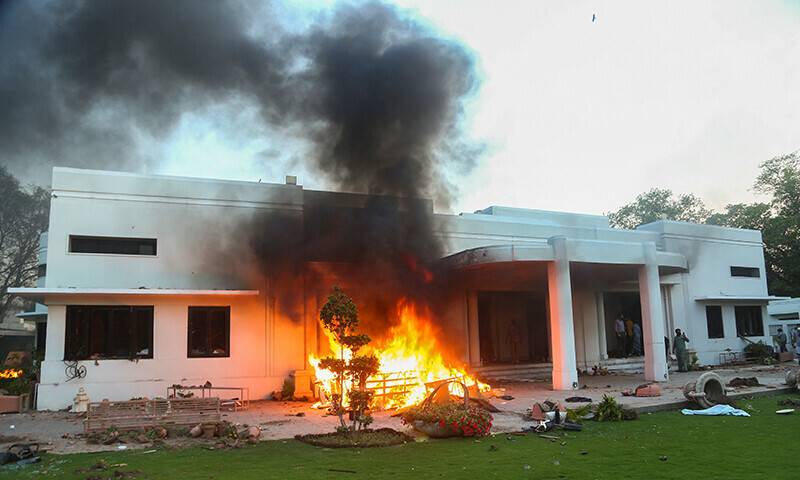Ashes ashes, we all fall down!

Stay tuned with 24 News HD Android App

The scenes were unreal. Brandishing sticks and stones, a fired-up crowd marched through security checkpoints, advancing deep into Lahore’s military cantonment. The protestors had had enough. Reaching the gated residence of lieutenant general Salman Fayyaz Ghani, the corps commander of Lahore, the mob stormed the compound. They had already threatened the government, but what was about to unravel had never been seen before. Having knocked down the gate, the charged crowd broke into the house, after completely ransacking and vandalizing the home, they set the residence on fire. “We warned you!” they roared.
Earlier in the day, former prime minister of Pakistan Imran Khan had been summoned to court to present himself in one of the many cases brought against him over the past year. Khan had previously evaded such summons, but this time sat patiently in the courthouse to submit his biometrics. During the process, Khan was arrested by the army’s paramilitary force in a corruption case totalling 190 million pounds.
After news broke out across the airwaves and WhatsApp groups, it was only a matter of time before Khan’s supporters would react. For months, they had cautioned the government over arresting their party leader. With Khan taken to an unknown location, his supporters gathered across the country, blocking roads, setting public property on fire including ambulances and police vehicles. In Lahore, they not only lit up the corps commander’s residence, but burnt down an Audi car showroom as well, assuming that the showroom’s owner was the son of an army officer. Anti-army slogans were raised in these protests, labeling the Pakistan military as terrorists. They demanded Khan’s release with arson and destruction.
In 2018, Imran Khan became Pakistan’s prime minister with the support of the country’s military The miltablishment forced censorship by muzzling critical media coverage against Khan, coerced prominent politicians to join his political party and flexed their muscle for favourable judicial decisions (Nawaz Sharif, a staunch rival of Imran Khan was politically banned for life by the Supreme Court of Pakistan). During his tenure, Khan brazenly utilized the miltablishment to govern, legislate and pressurize the opposition.
However, once the honeymoon period was over between Khan and the military, a messy divorce ensued. Khan was ousted from office in a vote of no confidence last year, and since then, has blamed a whole host of factors for his removal including the United States, his own army chief, the current interim chief minister of Punjab and rogue generals.
Pakistan, unfortunately, is no stranger to such divorces. The country has yet to have a prime minister complete a full term in office. A majority of those who have been able to sit in the coveted chair, only managed to do so with the facilitation of the military. Zulfiqar Ali Bhutto, Benazir Bhutto, and Nawaz Sharif were all supported by the military prior to becoming prime ministers. It is only once they came into office, did they realize how deeply entrenched the miltablishment was in civilian affairs. And when they all tried to assert supremacy, they were either judicially hanged, assassinated or banned for life.
The only enemy of Pakistan’s democracy is the political engineering conducted by the miltablishment. The country’s first prime minister, Liaquat Ali Khan was assassinated and soon after, the sister of Muhammad Ali Jinnah, who stood by her brother in the fight for Pakistan’s independence was labelled a traitor by the country’s first military dictator. Cognizant of such interference and engineering, Nawaz Sharif and Benazir Bhutto signed a Charter of Democracy in 2007 to ensure the military was kept out of politics. Unfortunately, Imran Khan seemed to have forgotten the army’s checkered history of disposing prime ministers and happily lapped up their support when it suited him. The charter needs to be implemented to ensure Pakistan is placed on a democratic trajectory.
It is still shocking to see footage of the corps commanders’ house being set on fire. Those scenes were unreal and frankly, unimaginable. The footage reminds me of a post I read the other day, “as our house burned, they fought to write their names in the ashes”. Pakistan now needs to heal. The economy is on a ventilator and 230 million people have become collateral in this on-going battle between Khan and the generals. The only way forward from this dark chapter is to engineer democracy. Free and fair elections must be held for a clean mandate, justice must be seen to be done and the military must go back to the barracks to play its constitutional role. This battle needs to end, before we are left with only ashes.
